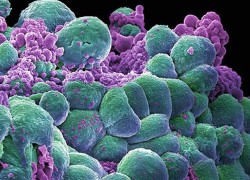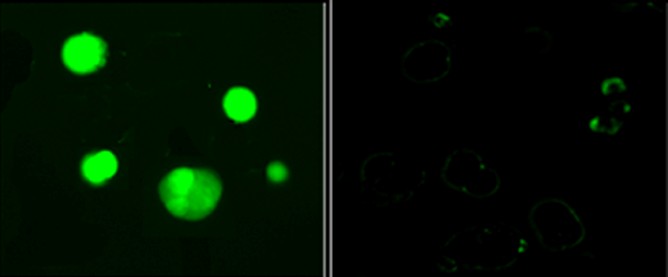October 3, 2014 – Did you know that bacteria “talk” to each other? The conversation is chemical and understanding that type of communication may lead to a way to prevent cancer cells from spreading or may even provide a means to tell them to die.
The method of communication releases molecules. One type of molecule may say “multiply.” Another may say “watch out for one of those T-cells, it could kill you.” And one may say “stop spreading.”
The research to discover this comes out of University of Missouri’s Comparative Oncology and Epigenetics Laboratory. It appears in PLOS ONE and is entitled, Bacterial Quorum Sensing Molecule N-3-Oxo-Dodecanoyl-L-Homoserine Lactone Causes Direct Cytotoxicity and Reduced Cell Motility in Human Pancreatic Carcinoma Cells. With a title like that you probably would have missed the implications of the research which involved the treating of cultured human pancreatic cancer cells with the bacterial molecule O-DDHSL. The treatment halted cell multiplication, migration and induced cellular death. In the image below the viable cancer cells appear on the left. After treatment with the O-DDHSL molecule in different concentrations and over a period of 24 to 48 hours, those same cells experienced apoptosis.
Apoptosis is not death from an external force. Instead it is programmed cell death. This happens to our body tissues over time but cancer cells seem resistant to normal cell aging. But by increasing the molecular message using this treatment the pancreatic cancer was induced to kill itself. Additional experiments with applications of O-DDHSL also decreased pancreatic cancer migration and new colony formation.
But treatment in a petri dish is not the same as treatment in a living patient. And as I read the study I didn’t get any indication whether the O-DDHSL molecule had any impact on healthy pancreatic cells. Would they have been programmed to die as well? So as interesting as this discovery is, it will be some time before this discovery finds its way from the laboratory to animal studies and then to clinical trials.




















[…] Shutting Down Cancer by Understanding its Communication System https://www.21stcentech.com/shutting-cancer-matter-understand…on-system/ […]